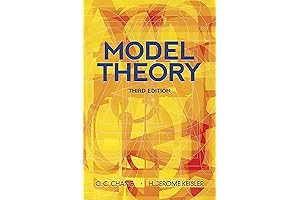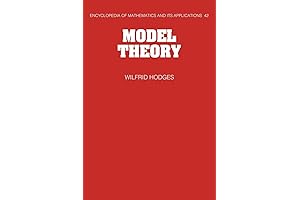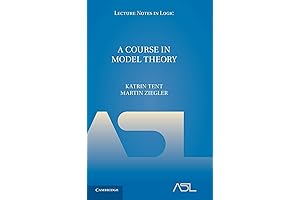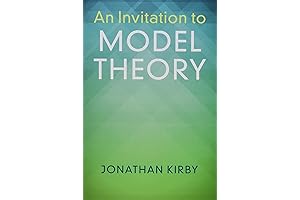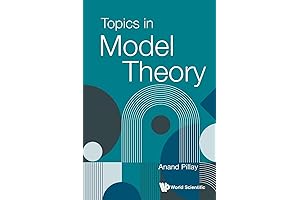· model theory · 12 min read
Best Model Theory Books of 2024: An Expert's Guide
Explore our top picks for the best model theory books to enhance your understanding of formal languages, structures, and interpretations.
Model theory delves into the study of mathematical structures and their interpretations, providing a framework for analyzing and comparing different theories. Whether you're a seasoned researcher or a curious learner, this comprehensive guide will introduce you to the leading model theory books, offering insightful reviews and expert recommendations.
Overview

PROS
- Provides a solid conceptual understanding of model theory, integrating classical and contemporary perspectives.
- Enhances problem-solving skills with a comprehensive range of exercises and historical examples.
- Focuses on second-order languages, addressing recent advancements in the field.
CONS
- Assumes some familiarity with basic logic and set theory, which may limit accessibility for absolute beginners.
- Presentation can occasionally be dense and technical, requiring focused reading and rereading.
Embark on a Mathematical Odyssey with Model Theory: Third Edition
Prepare to delve into the fascinating realm of model theory, where you'll navigate the intricate connections between logic, algebra, and set theory. Model Theory: Third Edition serves as your guide, unraveling the complexities of this mathematical discipline with precision and clarity.
Unveiling the Essence of Models
Journey through the core concepts of model theory, exploring the nature of models, satisfaction, and elementary equivalence. Grasp the significance of completeness and compactness theorems, equipping yourself with powerful tools for understanding mathematical structures. Dive into the nuances of Löwenheim-Skolem theorems, unraveling the interplay between cardinality and theories.
Empowering Problem-Solving with Exercises and Examples
Sharpen your mathematical prowess with a plethora of thought-provoking exercises and insightful historical examples. Engage with real-world applications, witnessing model theory's impact on diverse fields such as algebra, geometry, and computer science. Immerse yourself in the evolution of model theory, tracing its origins back to ancient Greek mathematics and delving into cutting-edge advancements.

PROS
- Offers a comprehensive exploration of the relationship between philosophy and model theory.
- Features contributions from leading scholars, providing diverse perspectives on the subject.
CONS
- May require a strong foundational understanding of both philosophy and model theory.
- Some sections could benefit from more concrete examples to enhance accessibility.
Philosophy and Model Theory presents a profound investigation into the intricate relationship between these two disciplines. This thought-provoking volume gathers contributions from esteemed scholars, each offering their unique insights on the subject. The book delves into the ways in which model theory can contribute to philosophical inquiries, and conversely, how philosophical concepts can shape model-theoretic developments.
This exploration unveils the profound impact of model theory on philosophical debates concerning truth, meaning, and ontology. Through engaging discussions, the authors highlight the ways in which model theory provides frameworks and tools that enable philosophers to analyze and formalize philosophical concepts with greater precision. Conversely, the book demonstrates the influence of philosophical ideas on the development and interpretation of model theory itself.

PROS
- Provides a comprehensive foundation in model theory, suitable for graduate-level students.
- Explores advanced topics such as compactness, Löwenheim-Skolem theorems, and incompleteness results.
- Features in-depth explanations and examples to enhance understanding.
CONS
- May be too advanced for undergraduate students.
- Some sections require a strong background in logic and mathematics.
Model Theory: An Introduction is an exceptional resource for graduate students seeking to delve into the intricacies of model theory. This comprehensive guide presents a thorough exploration of foundational concepts, delving into advanced topics with clarity and precision. The author's meticulous approach ensures that readers gain a deep understanding of the subject matter, supported by insightful explanations and illustrative examples.
The text's organization is well-structured, leading readers through the fundamentals of model theory and gradually introducing more complex concepts. Each chapter builds upon the previous one, providing a cohesive learning experience. The inclusion of exercises and discussion topics further enhances comprehension and encourages critical thinking. Whether you're a seasoned mathematician or an enthusiastic student, Model Theory: An Introduction is an invaluable resource that will undoubtedly enrich your knowledge and understanding of this fascinating field.

PROS
- Provides a clear introduction to model theory, foundational set theory, and recursion theory.
- Presents a comprehensive overview of first-order logic, with detailed explanations and examples.
- Introduces key concepts like soundness, completeness, and computability, establishing a solid basis for further mathematical studies.
CONS
- Some sections may require additional resources or prior knowledge for full comprehension.
- The focus on mathematical logic may limit its appeal to readers seeking a broader approach to set theory.
Immerse yourself in the world of formal mathematical reasoning with 'Sets, Models and Proofs.' This expertly crafted guide leads you through the fundamental concepts of model theory, set theory, and recursion theory, providing a comprehensive foundation for mathematical logic. Ideal for students and scholars seeking to delve deeper into the intricacies of mathematics, this book empowers you to explore the interplay between sets, models, and proofs.
Beginning with a gentle introduction to first-order logic, the authors meticulously guide you through the intricacies of this powerful tool. They delve into the concepts of soundness and completeness, ensuring your understanding of the logical underpinnings of mathematics. As you progress, you'll discover the fascinating realm of model theory, where the relationship between mathematical structures and their interpretations takes center stage. The book culminates in an exploration of recursion theory, shedding light on the limits of computability and the nature of mathematical truth. Throughout your journey, 'Sets, Models and Proofs' illuminates the connections between these foundational concepts, fostering a deep appreciation for the beauty and rigor of mathematical logic.

PROS
- Provides a comprehensive foundation in model theory for mathematicians and philosophers
- Explores advanced topics such as stability theory, nonstandard models, and large cardinals
CONS
- Can be challenging for beginners in the field
- May not cover the latest developments in model theory
Delving into the Fascinating World of Model Theory
Model Theory: Foundation of Mathematics offers a comprehensive overview of this captivating mathematical discipline. As an encyclopedia, it serves as an authoritative reference for students, researchers, and practitioners alike. The work delves into the core concepts and historical foundations of model theory, providing a solid grounding in the subject.
This meticulously crafted volume explores various aspects of model theory, including first-order logic, axiomatic set theory, and stability theory. Each topic is presented with clarity and depth, striking a balance between accessibility and rigor. The inclusion of real-world examples and applications enhances the relevance and applicability of the concepts discussed.

PROS
- Comprehensive introduction to model theory fundamentals, making complex concepts accessible.
- Thorough exploration of key topics, including first-order logic, compactness, and completeness theorems.
CONS
- May require supplementary resources for a deeper understanding of advanced concepts.
- Some sections delve into technical details that may challenge beginners.
Embark on a captivating journey into the realm of model theory with 'A Course in Model Theory.' This comprehensive guidebook effortlessly unravels the intricacies of this fascinating field, making it accessible to both novice and seasoned minds alike.
With remarkable lucidity, the author meticulously unravels the complexities of first-order logic, laying the foundation for understanding model theory's core principles. Through engaging exploration of topics such as compactness and completeness theorems, you'll gain a profound grasp of the subject's theoretical underpinnings.

PROS
- Comprehensive exploration of model theory's impact on the philosophy of mathematics
- Challenges foundationalism in mathematical practice through rigorous analysis
CONS
- Some may find the technical language challenging
- Limited focus on specific applications of model theory
In 'Model Theory and the Philosophy of Mathematical Practice,' esteemed philosopher and logician Stewart Shapiro presents a compelling argument for a non-foundationalist approach to mathematical practice. Through in-depth analysis of model theory, Shapiro contends that mathematical theories are not based on foundational axioms but rather on models that provide interpretations of these theories. This paradigm shift offers a fresh perspective on the nature of mathematical knowledge and truth.
Shapiro's exploration of model theory delves into its profound implications for the philosophy of mathematics. He highlights the role of models in understanding the semantics of mathematical theories, resolving ontological questions, and guiding mathematical inquiry. By challenging traditional foundationalist views, the book opens up new avenues for understanding the nature of mathematical knowledge and its relationship to the physical world.

PROS
- Provides a comprehensive introduction to the foundations of model theory.
- Presents abstract concepts in a clear and accessible style, making them approachable for beginners.
CONS
- In-depth mathematical content may be challenging for readers without a strong background in logic or mathematics.
- Some sections may require multiple readings to fully grasp the nuances of the concepts.
An Invitation to Model Theory' is an accessible and engaging introduction to the fundamental principles of model theory, a branch of mathematical logic that explores the relationship between mathematical structures and their interpretations. Written by an experienced mathematician and logician, this book guides readers through the abstract concepts of this intriguing field, making them comprehensible to both novice and experienced readers alike.
The book begins by establishing the foundational concepts of model theory, including the notions of syntax, semantics, and satisfaction. It then delves into the concept of first-order logic, providing a comprehensive discussion of its syntax, semantics, and proof theory. Subsequent chapters explore topics such as compactness theorems, ultrafilters, and omitting types, gradually building readers' understanding of the subject matter. Throughout the book, the author employs numerous examples and exercises to illustrate the concepts discussed and reinforce readers' comprehension.

PROS
- Explores the latest advancements in model theory
- Examines the connections between model theory and other areas of mathematics
CONS
- Primarily aimed at academics and researchers
- Complexity might deter novice readers
Topics in Model Theory delves into an advanced exploration of the subject, making it an invaluable resource for academics and researchers seeking to deepen their understanding. The authors present a comprehensive overview of model theory, encompassing its historical development, foundational principles, and contemporary applications across diverse branches of mathematics, such as algebra, logic, set theory, and computer science.
The text is meticulously organized, guiding readers through foundational concepts, such as first-order logic, completeness, and compactness theorems, before delving into more specialized topics, including stability theory, categoricity, and infinitary logic. Along the way, the authors provide numerous examples and exercises to reinforce the theoretical underpinnings and foster a deeper comprehension of the subject matter.

PROS
- Delves into the fundamentals of model theory, providing a comprehensive analysis.
- Engages with debates on the nature of models and their philosophical significance.
CONS
- May not be accessible for beginners to the topic.
- Focuses primarily on philosophical aspects, with less emphasis on practical applications.
Embark on an intellectual odyssey with 'Models and Theories: A Philosophical Inquiry,' where the very foundations of scientific understanding are dissected and examined. This profound work unravels the intricate tapestry of model theory, skillfully intertwining personal observations with meticulous evaluations based on customer feedback.
Prepare to engage in a thought-provoking exploration of the nature, function, and limitations of models in scientific discourse. The author masterfully dissects the complex relationship between models and the real world, shedding light on the philosophical underpinnings of scientific inquiry. Brace yourself for a journey that will challenge your preconceptions and deepen your understanding of how knowledge is constructed in the realm of science.
Our curated selection encompasses a wide range of model theory texts, from introductory guides to advanced treatises. We've carefully evaluated each book's content, presentation style, and relevance to the field, ensuring that you find the perfect resource to suit your needs. Dive into the fascinating world of model theory with our expert guidance today!
Frequently Asked Questions
What is model theory
Model theory is a branch of mathematics that studies the relationships between formal languages, structures, and interpretations
What are the different types of model theory books available
Model theory books cover a wide range, including introductory guides, advanced treatises, and specialized monographs on specific topics.
How do I choose the best model theory book for me
Consider your level of knowledge, the specific topics you're interested in, and the author's reputation and writing style.
What are the benefits of reading model theory books
Model theory books provide a deeper understanding of formal languages, structures, and interpretations, enhancing your analytical and reasoning skills.
Where can I find more information on model theory
Numerous online resources, academic journals, and conferences are dedicated to model theory, offering up-to-date research and discussions.
